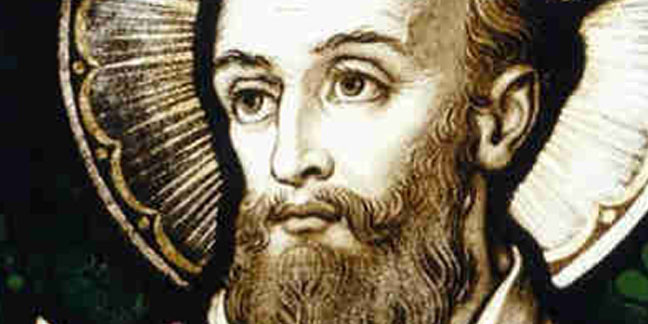Francis de Sales was born of noble and pious parents near Annecy in what is now France 1567. He was born two months prematurely and nearly died, and his mother consecrated him to the Lord in the presence of the Holy Shroud (of Turin). From an early age he was curious about the mysteries of the faith, thoughtful yet quick-tempered. He studied with brilliant success in Paris and in Padua, particularly enjoying theology, Scripture and debating.
After returning from Italy, he gave up the grand legal career and an arranged marriage that his father had marked out for him, and in 1593 he was ordained a priest. His father had objected, but his cousin and fellow priest Louis de Sales interceded with the local bishop.
When the Duke of Savoy had resolved to restore the Church in the Chablais region, which had fallen under the influence of Calvinist Protestants, the local bishop put out a call for missionaries. Francis was the only volunteer for the dangerous work.
Catholic worship had been outlawed for an entire generation and only recently permitted to be practiced again. Churches had been burned or destroyed when not appropriated for Protestant use. Religious orders were suppressed and priests were exiled. One local missionary priest who had ventured into the area before Francis was forced to flee for his life.
Nonetheless, Francis insisted on going, even over his father's pleas to the bishop. He was unanimously accepted for the mission – no one else wanted the job.
Francis set out on foot with his Bible, breviary and one companion, his loyal cousin Louis.
Every door and every heart was closed against him. He was rejected with insult and threatened with death. But nothing could stop him, and before long the Church burst forth into a second spring with the Counter Reformation. It is estimated that Francis converted 72,000 Calvinists.
Francis was then compelled by the pope to become coadjutor bishop of Geneva in 1599, and he was named bishop in 1602. His fame as a preacher spread abroad, and from 1600 until his death he delivered Lent and Advent sermons in many of the great cities of France. In his diocese he set up schools and paid special attention to the poorer parishes. He was instrumental in the important reform of the Cistercian abbey Port-Royal.
At times the exceeding gentleness with which he received heretics and sinners almost scandalized his friends. One of them said to him, "Francis of Sales will go to Paradise, of course; but I am not so sure of the Bishop of Geneva: I am almost afraid his gentleness will play him a shrewd turn."
"Ah," said Francis, "I would rather account to God for too great gentleness than for too great severity. Is not God all love? God the Father is the Father of mercy; God the Son is a Lamb; God the Holy Ghost is a Dove – that is, gentleness itself. And are you wiser than God?"
Together with St. Jane Frances de Chantal, he founded the Order of the Visitation at Annecy for women who could not undergo the austerities of the great established orders. It soon spread throughout Europe. Though poor, he refused provisions and dignities, and he even turned down the great see of Paris.
His "Introduction to the Devout Life" is a widely read religious classic. His other major work is the "Treatise on the Love of God." He is the patron saint of Catholic writers. His feast day is Jan. 24.
He died at Avignon on Dec. 28, 1622, after giving a nun his last word of advice: "Humility."
— Sources: Catholic News Agency, The Catholic Encyclopedia, www.catholic-saints-resource-center.com, www.fransalians.com



